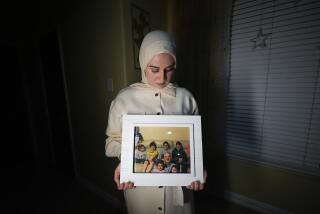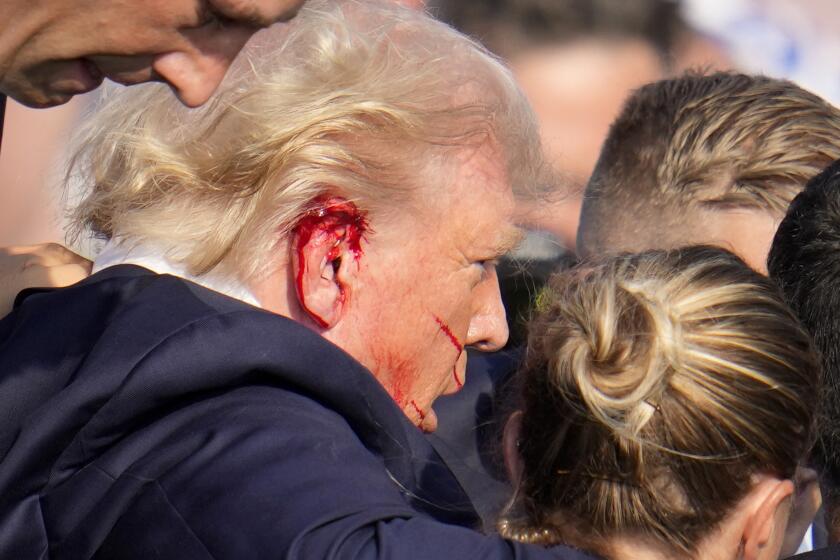U.S. aid worker Peter Kassig beheaded by Islamic State
Islamic State militants have beheaded Peter Kassig, a U.S. aid worker and former Army Ranger who was captured last year in Syria while on a private humanitarian mission, the White House confirmed Sunday.
U.S. officials authenticated a 16-minute video, released on various social networks by the militant group earlier in the day. The video also includes images of the mass beheading of men said to be Syrian government soldiers.
Kassig, 26, became the third U.S. citizen known to have been executed by Islamic State, an Al Qaeda offshoot that controls vast swaths of territory in Syria and neighboring Iraq. The group arose amid the tumult of the Syrian conflict, now in its fourth year.
President Obama condemned his killing as an “act of pure evil by a terrorist group that the world rightly associates with inhumanity.”
The slain hostage’s parents, Ed and Paula Kassig, issued a statement from Indianapolis saying they were heartbroken that their son had been executed “as a result of his love for the Syrian people and his desire to ease their suffering. Our heart also goes out to the families of the Syrians who have lost their lives.”
The grieving couple also expressed condolences to the families of the other four Western hostages who have been killed by Islamic State, while saying they prayed for the safe return of all captives in the Syrian war.
“We are incredibly proud of our son for living his life according to his humanitarian calling,” the couple said. “We will work every day to keep his legacy alive as best we can.”
Islamic State has previously released videos of the beheading of two U.S. journalists, James Foley and Steven Sotloff. The militants have also beheaded two British aid workers, David Haines and Alan Henning. The group says the killings are revenge for the ongoing, U.S.-led air campaign against its fighters in Syria and Iraq.
The beheading of Kassig and the other hostages has fueled a sense of outrage in the West and built support for military action against Islamic State, which has proclaimed that its following is growing throughout the Middle East and elsewhere — even as its military advances have now largely been halted, in part because of the U.S. bombing campaign.
Over the weekend, Iraqi authorities said they had opened a corridor to the nation’s largest oil refinery in Baiji, which has been under Islamic State siege since June. And in northern Syria, Islamic State has suffered huge losses and been foiled in a weeks-long offensive to overrun Kobani, a city near the Turkish border that is under the control of a secular Kurdish militia. Scores of U.S. airstrikes have struck militant positions in and around Kobani.
In a statement issued from Air Force One as he flew home from Australia, Obama referred to the victim as Abdul-Rahman Kassig, “also known to us as Peter.”
Kassig adopted the Arabic name after converting to Islam while in custody, his family said. His parents refer to him as Abdul-Rahman on a Facebook page dedicated to his release.
The president offered America’s prayers and condolences to Kassig’s parents and other family members. “We cannot begin to imagine their anguish at this painful time,” he said, adding that Kassig’s life and deeds stand in stark contrast to everything Islamic State, also known as ISIL, represents.
“While ISIL revels in the slaughter of innocents, including Muslims, and is bent only on sowing death and destruction, Abdul-Rahman was a humanitarian who worked to save the lives of Syrians injured and dispossessed by the Syrian conflict,” Obama said.
Islamic State demonstrated that it represented no faith, he said, “least of all the Muslim faith which Abdul-Rahman adopted as his own.”
Unlike videos released after the previous decapitations of Western hostages, the one issued Sunday does not show Kassig alive or during his execution. The other hostages, clearly under duress, were shown making statements critical of their governments before they were killed.
Early in the latest video, more than a dozen Islamic State fighters are shown beheading, in synchronized fashion, an equal number of Syrian government soldiers. Each militant grabs a knife from a box before proceeding to the gruesome task. The graphic video then shows a black-clad, masked militant with what sounds like a British accent saying that Kassig had been beheaded.
“This is Peter Edward Kassig, a U.S. citizen,” the militant declares, standing over a severed head. “Peter, who fought against the Muslims in Iraq while serving as a soldier under the American Army, doesn’t have much to say. His previous cellmates have already spoken on his behalf.”
It is not clear when or where the video was shot.
Matt Olsen, former director of the National Counterterrorism Center, speculated that Kassig may have refused to cooperate and speak on the video, although there was no independent corroboration of that scenario. He also said the executioner’s British accent suggested it was the same person who beheaded the other hostages, a militant dubbed “Jihad John” by the British media whose identity is the focus of intense investigation by British and U.S. officials.
Asked about broad threats to Americans issued in the video, Olsen, speaking on ABC’s “This Week,” said Islamic State militants have the capacity to carry out small-scale attacks, but not on a scale that suggests an imminent danger to Americans outside the war zone.
Kassig served 15 months in the U.S. Army, including a deployment in Iraq from April to July 2007, before receiving a medical discharge as a private first class in September 2007, according to Pentagon records.
He traveled to Lebanon while on spring break from college in 2012 and began working with Palestinian refugees and victims of the Syrian war. He later founded an aid organization, Special Emergency Response and Assistance, largely funded with his savings and donations from relatives and others in the United States.
The group delivered medical supplies, food and other aid to rebel-held areas of Syria and also provided trauma training to medics treating victims of the Syrian conflict. Kassig, a trained emergency medical technician, was deeply devoted to the aid mission, friends and family said.
Before turning to humanitarian assistance, Kassig had spent much of his late teens and 20s “searching for his place in the world,” his family said in a statement last month. “He felt called to be a peacemaker” after his time in the military, his family said.
“The truth is sometimes I really think I would like to do something else, but at the end of the day, this work is really the only thing that I have found that gives my life both meaning and direction,” Kassig told Time magazine in early 2013, before being taken prisoner.
According to colleagues, Kassig had made several trips into Syria on aid missions before he was detained on Oct. 1, 2013, near the eastern Syrian city of Dair Alzour, a militant stronghold. He was fully aware of the risks, friends said, but felt he had to travel to areas where need was greatest.
A news blackout surrounded Kassig’s detention for a year until a video surfaced last month showing a masked militant threatening a man identified as Kassig.
Since then, friends and family members have been publicly calling on Islamic State to release Kassig, citing his humanitarian efforts with Syrians and his conversion to Islam.
Little is known publicly about what behind-the-scenes efforts U.S. officials made to free Kassig. The families of Foley and Sotloff have expressed frustration that federal authorities warned that they could be prosecuted if they paid ransoms. A number of European hostages in Syria were released after ransoms were paid. Long-standing U.S. policy bans paying ransoms to terrorist groups.
In a statement Sunday, U.S. Secretary of State John F. Kerry said that Kassig’s family “and the entire government” had “worked hard to avoid this tragic outcome.”
In August, after Foley’s beheading, the Pentagon revealed that U.S. special forces had mounted an air and ground operation to rescue Foley and other hostages at a compound in northern Syria. The mission failed because the hostages were not at the targeted site, the Pentagon said.
Last month, as part of the public campaign urging Kassig’s freedom, his family released portions of a letter that Kassig had penned to his parents while in captivity.
“If I do die, I figure that at least you and I can seek refuge and comfort in knowing that I went out as a result of trying to alleviate suffering and helping those in need,” Kassig wrote in the letter, which was brought out of Syria by a released hostage. “Just know I’m with you.”
McDonnell reported from Beirut and Skiba from Washington. Special correspondent Nabih Bulos in Beirut contributed to this report.
More to Read
Sign up for Essential California
The most important California stories and recommendations in your inbox every morning.
You may occasionally receive promotional content from the Los Angeles Times.






